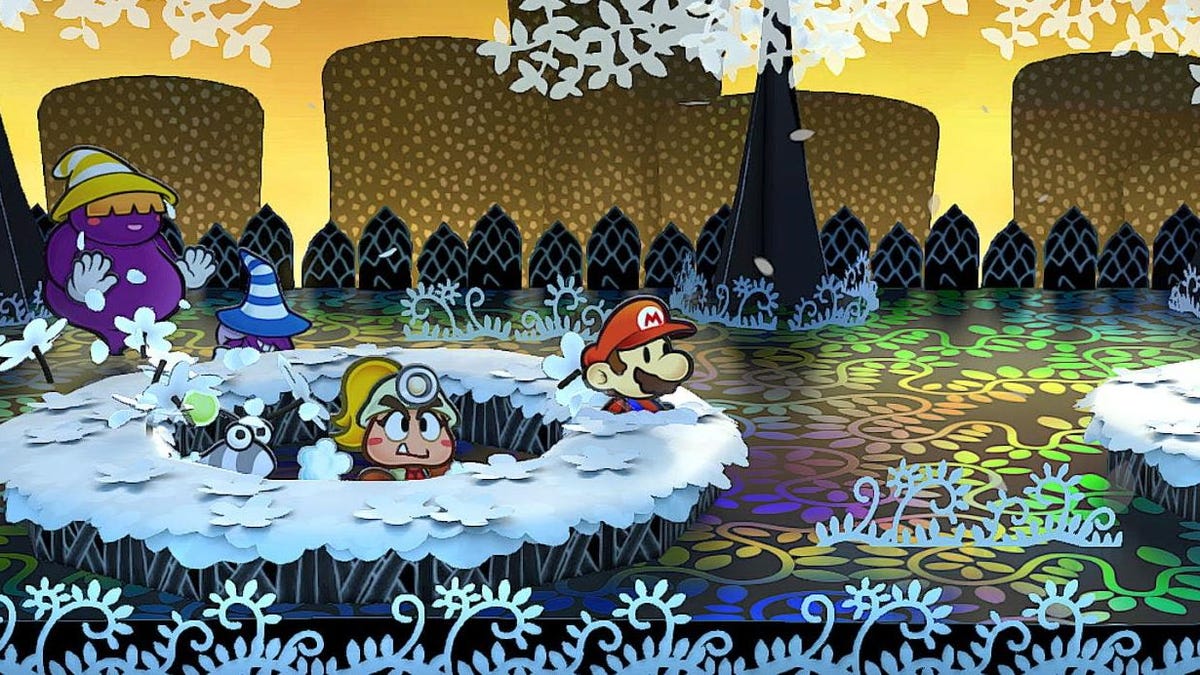Tech
Paper Mario: The Thousand-Year Door Remaster Hailed As The Definitive Version Of An All-Time RPG Classic

Fans have been clamoring for Nintendo to bring back Paper Mario: The Thousand-Year Door for years. Arguably the most beloved entry in the gonzo RPG series, it sounds like the Switch remaster has delivered on all of the magic of the original while sanding off a few of the rougher edges for modern audiences.
Out May 23, reviews are calling Paper Mario: The Thousand-Year Door on Switch the definitive version of the GameCube classic. The RPG follows Mario and an eclectic group of pals as they hunt for stars on a treasure map to unlock the secret behind the titular Thousand-Year Door. Turn-based combat has you hitting buttons in real-time to make attacks and other techniques more effective, and a badge system lets you experiment with different strategies. Another highlight is the writing, which isn’t afraid to be both funny and weird. And after years of gimmick-driven sequels, the lost GameCube gem offers a purer, more old-school RPG alternative to the likes of Paper Mario: Color Splash and Paper Mario: The Origami King.
At the time of this writing, the new release of Paper Mario: The Thousand-Year Door has an 89 on Metacritic, and it doesn’t appear to have cut any of the story beats or dialogue that has stuck with fans for decades. But it also doesn’t appear to have added much in the way of new content, making it feel like more of a straight HD port. “The Thousand-Year Door has all the ingredients of an incredible turn-based RPG,” wrote Steven Petite for GameSpot, while at Nintendo Life Alana Hagues wrote that the remaster falls slightly short of last year’s Super Mario RPG when it comes to adding additional gameplay wrinkles.
Here’s a round-up of what others are saying about Paper Mario: The Thousand-Year Door.
IGN
Rogueport and its surrounding areas are bursting with personality thanks to writing that’s just as sharp and funny today as it was in 2004. It also introduces a host of modern improvements that streamline (but don’t eliminate) the original’s backtracking issues, easily making this the best way to experience Mario’s quest to gather the Crystal Stars.
GameSpot
The Thousand-Year Door has so many great lines of dialogue that touch on the full range of human emotions that it’s absolutely worth your time to talk to every NPC you encounter and read the messages sent to Mario’s Game Boy Advance SP communication device—there are some real gems in there. A few lines of dark humor actually made my mouth drop, and it’s hard to believe that the words of a Bob-omb with a steering wheel attached to his back got to me more than any game in a long time. There’s even a conversation about the need for renewable energy sources—as a reminder, this game is from 2004.
Polygon
Paper Mario: The Thousand-Year Door is one of the last times that Mario didn’t feel like a carefully managed pop star, never allowed to appear even remotely unlikable. In The Thousand-Year Door, however, he can be a little prick, should you so choose, telling people to “beat it, loser!” as if a little paper mustachioed man was capable of intimidating anyone. The fact that this game is returning on its 20th anniversary, hot off the heels of a remake of the similarly idiosyncratic and beloved Super Mario RPG, hearkens back to a time when a big Mario game could be for a specific kind of person, and not necessarily for everyone.
Digital Trends
If you were hoping that Paper Mario: The Thousand-Year Door on Nintendo was a thorough remake that redefines a classic, you may come away from this Switch remake disappointed. Thankfully, The Thousand-Year Door still holds up 20 years after release, thanks to some hilarious dialogue, timeless visuals, and an approachable RPG battle system. While it’s a bit of a bummer that Nintendo’s 2024 game lineup is mostly comprised of remakes, I’m glad Nintendo is giving The Thousand-Year Door a second shot at life. It truly isn’t like any other Mario game out there.
Game Informer
For all the annoyances of repeating areas and slow (but engaging) combat, Thousand-Year Door is now a series highlight. It marks the first instance of where I didn’t want a Mario RPG to go (I generally prefer the Mario & Luigi direction), but the constant fourth-wall breaking, myriad colorful and unique characters, and its willingness to just be weird all lead to a joyful journey. I am grateful that this shined-up version of the GameCube classic I missed is finally available on a contemporary platform.
TheGamer
To contrast, the next level has you infiltrate a haunted church in order to lift a curse that turns villagers into pigs. It’s giving Majora’s Mask, and the fact that it doesn’t end with the boss battle – the twist here is great – gives it life and vibrancy, despite the dim corridors you explore. The platforming puzzles are clever, but it’s all over too quick. After spending such a long time in the wrestling ring, I was excited to get back to the game proper, and felt shortchanged.
Engadget
It’s too bad Nintendo had to lower the frame rate down to 30fps from the Gamecube’s silky smooth 60fps, but it’s not the end of the world. If you can enjoy some of the greatest games ever made in 30fps, like Breath of the Wild and Tears of the Kingdom, The Thousand Year Door is no different. The remake also adds enough new graphical elements to make it look better than the original. I’m sure I nailed the game’s timing-based moves more often in 60fps, but they’re still fairly easy to pull off (except for those damn counters).
VGC
Like most Paper Mario games, the narrative is the star here. But where other entries have been let down by their occasionally gimmicky gameplay, Thousand-Year Door’s RPG mechanics remain pleasingly robust and consistently engaging, with players able to battle foes alongside their companions in turn-based battles, and level up their stats upon defeating enough of them. At the time, these systems will have felt staunchly conservative. There’s little here that didn’t feature in the first two Mario RPG games, or indeed a decade of genre classics released before it. But after enduring dozens of tedious Paper Mario reinventions in the years since, it is frankly something of a relief to return to a set of balanced and compelling mechanics, with no stickers, cards, or bags of confetti in sight.
TechRadar
Paper Mario: The Thousand-Year Door’s Nintendo Switch remake demonstrates that the 20-year-old Gamecube role-playing game has aged like a fine wine, barely touching its gameplay elements while offering a stunning glow-up in the visual department. Some may lament the 30fps cap and some rather antiquated backtracking, but it remains a thoroughly charming and engaging experience from start to finish.








